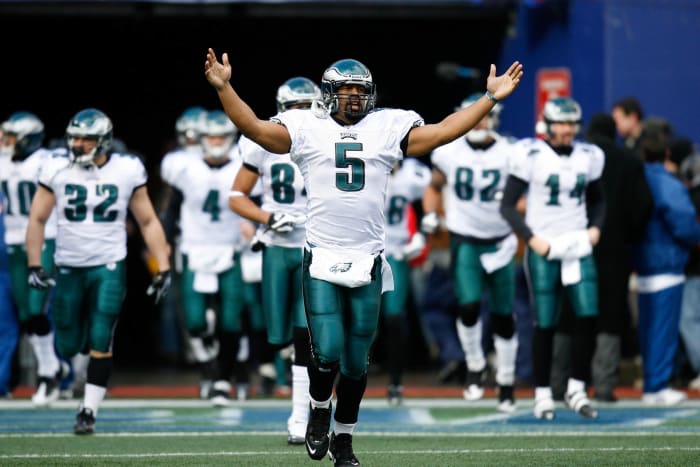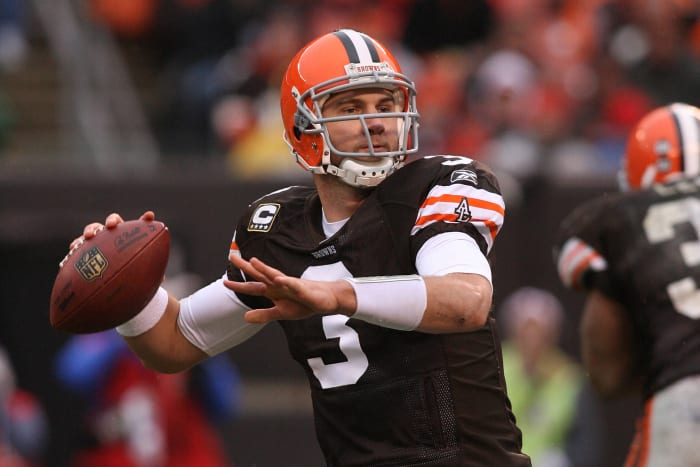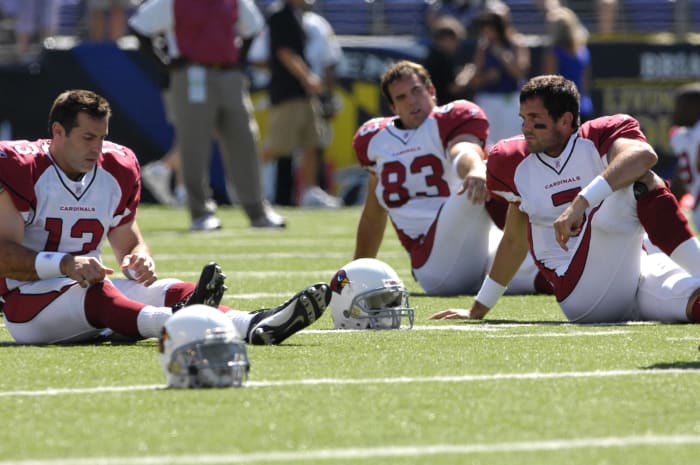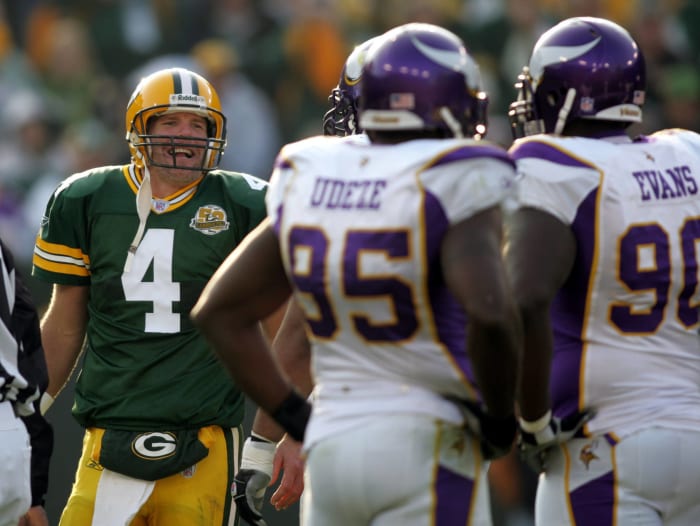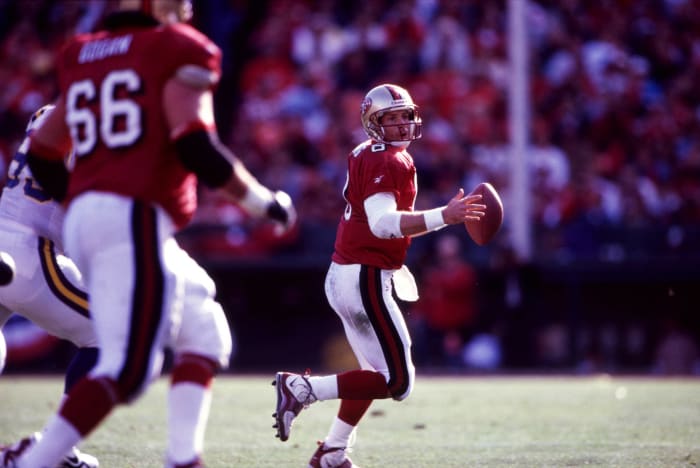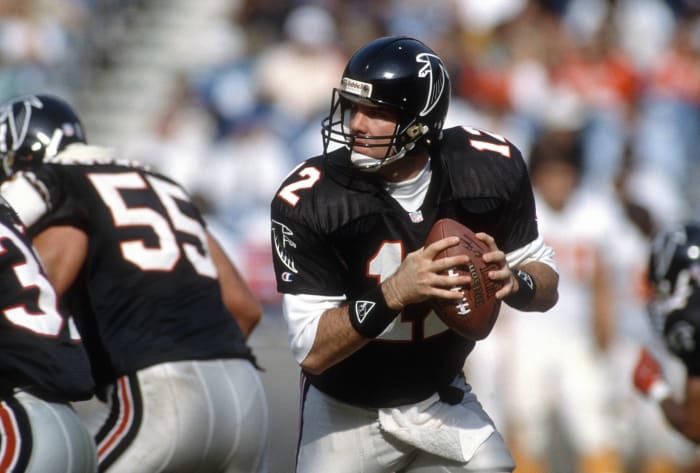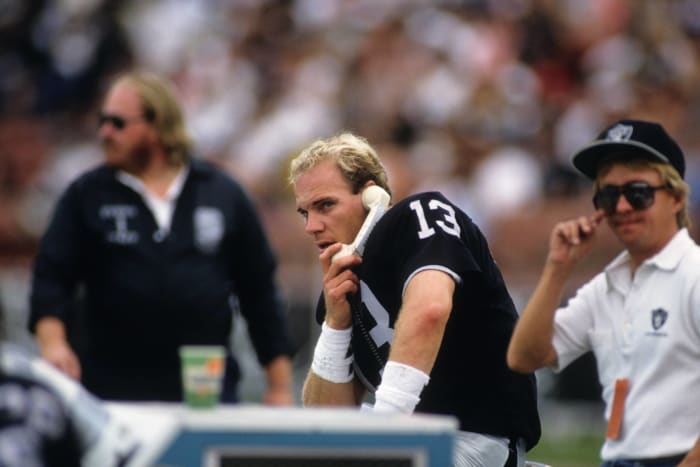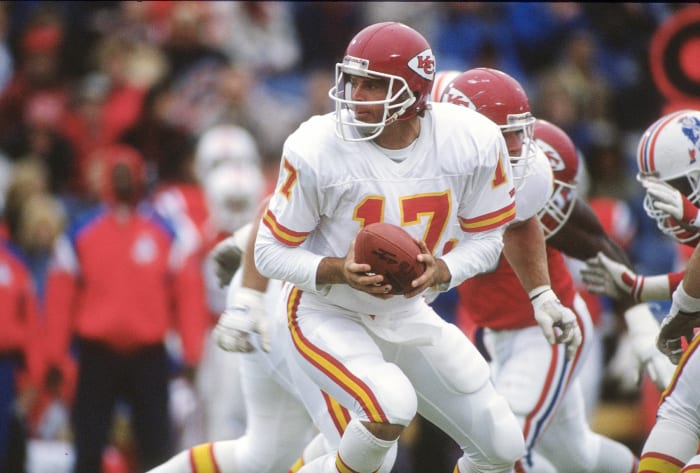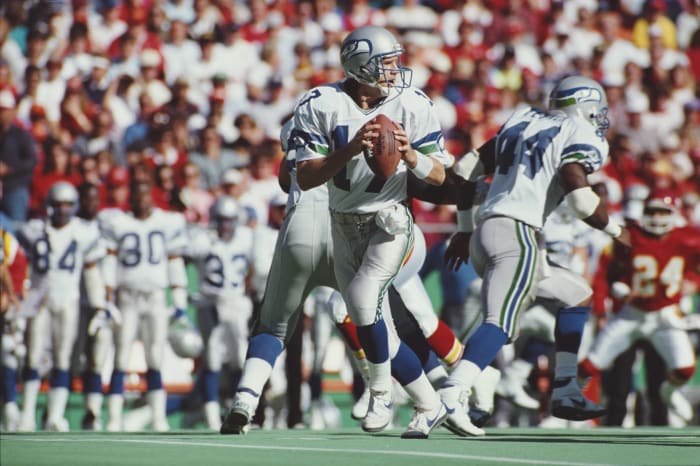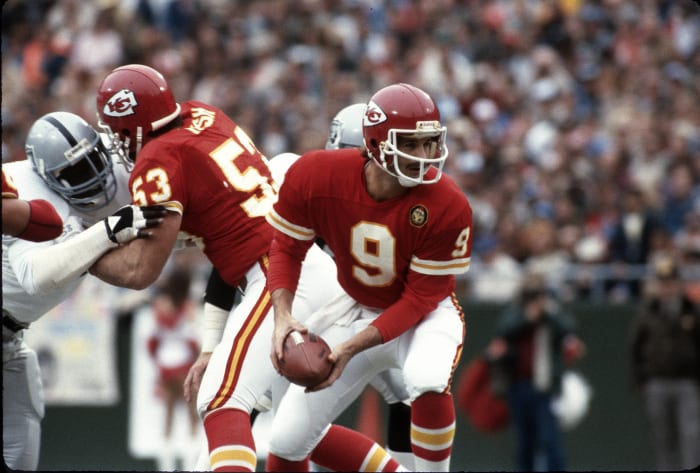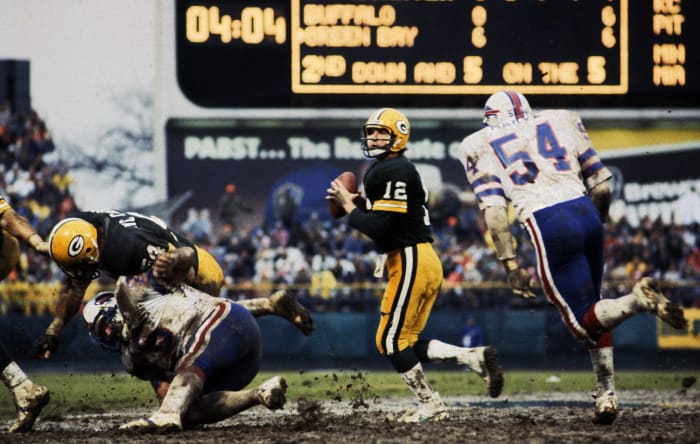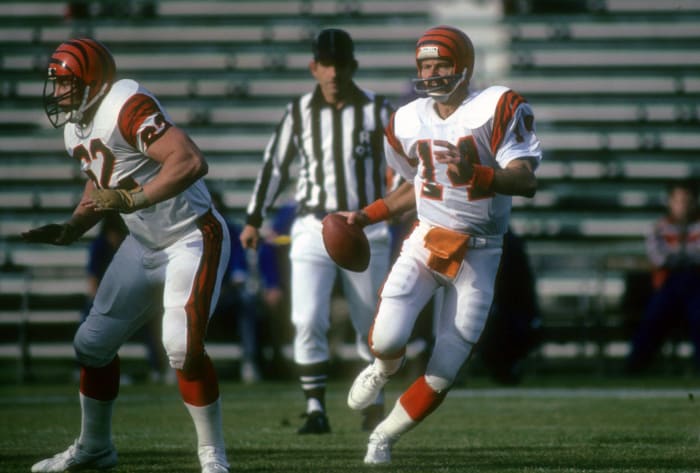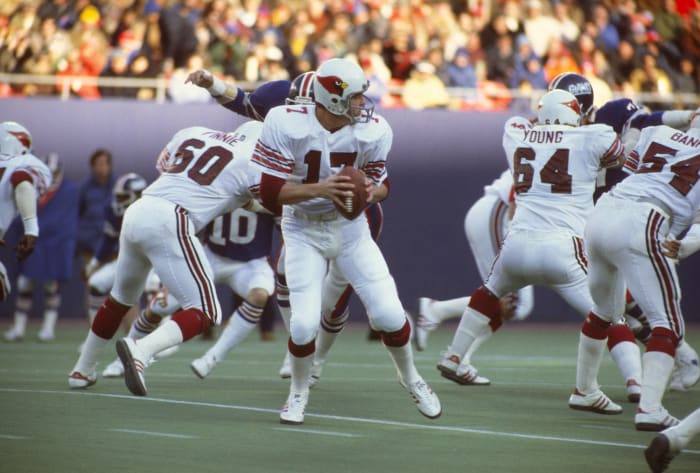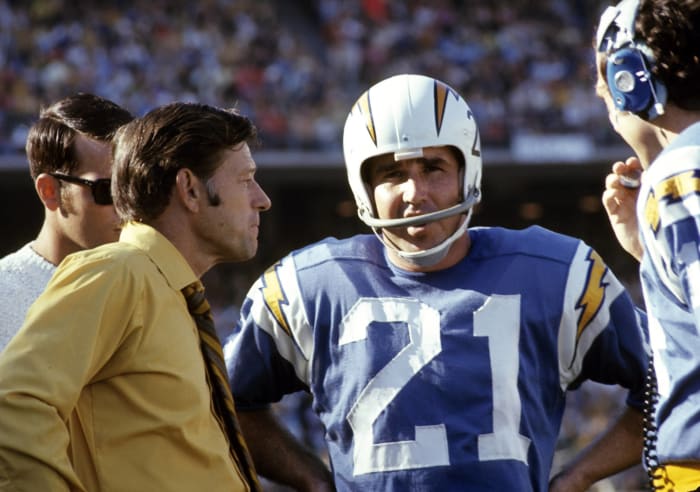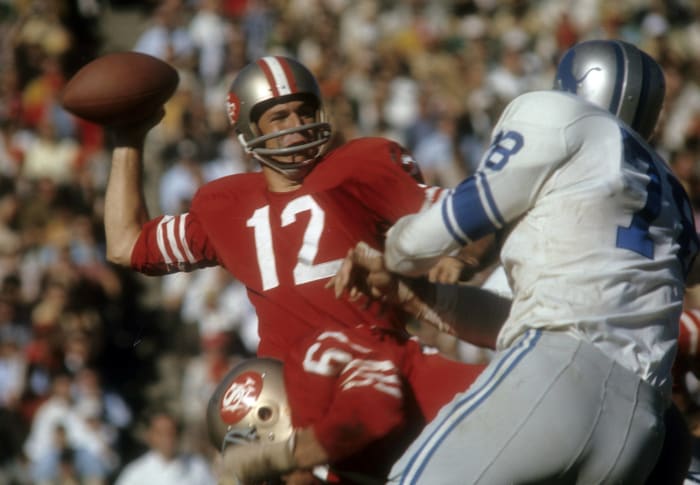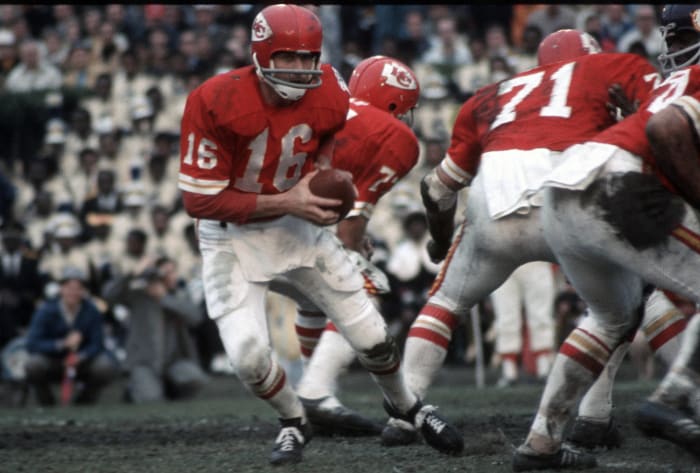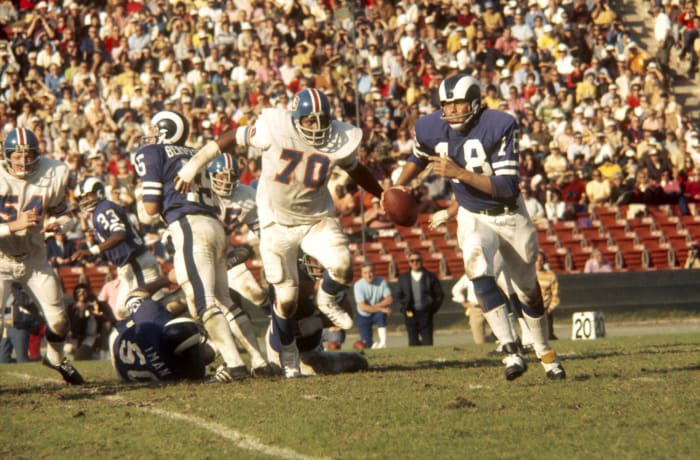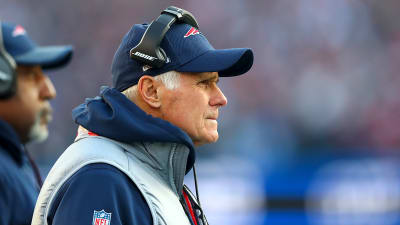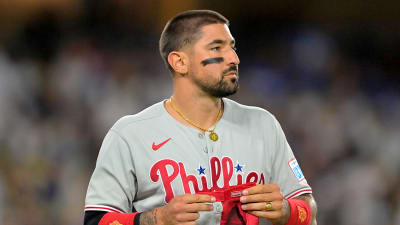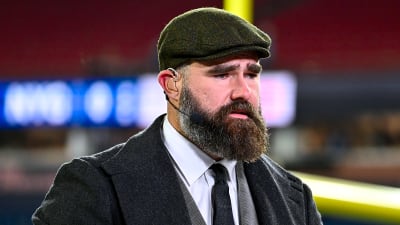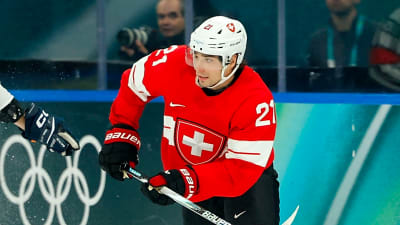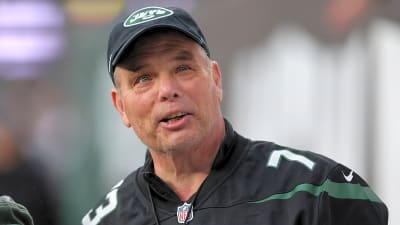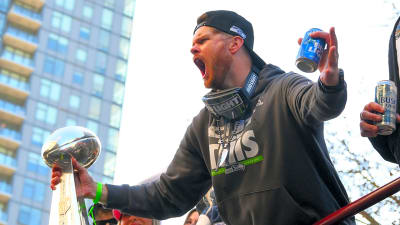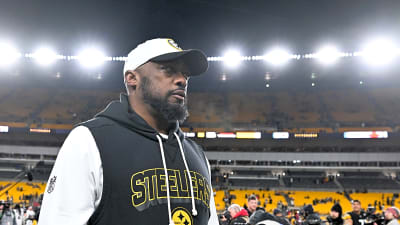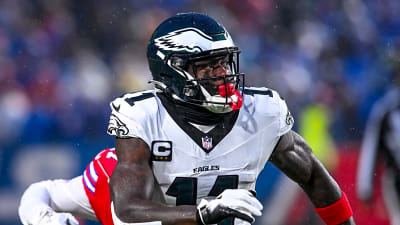Three of the teams who chose quarterbacks in the first round of the 2021 draft have veterans in place as bridge starters. Round 1 picks usually earn starting jobs early, but that is not always the case. Several incumbents throughout history have held off hotshot prospects. Here are the signal-callers who either made top picks wait years or changed teams' plans altogether.
Bob DeChiara-USA TODAY Sports
The No. 62 overall pick in 2014, Jimmy Garoppolo was not expected to take over for Tom Brady within a year or two. But Brady endured a down 2013, leading to the Patriots taking a second-round QB for the first time in Brady's tenure. Garoppolo fared well during Brady's Deflategate ban in 2016, despite missing some time due to an injury during that window, and saw his stock rise around the league. With Brady returning to form, the Pats dealt Garoppolo months ahead of a possible 2018 franchise tag decision. Brady and Robert Kraft may or may not have engineered the move, and the legendary starter played two more seasons in New England.
Brian Garfinkel/Icon Sportswire
The Eagles drafted Kevin Kolb in the 2007 second round, ahead of McNabb's age-31 season. Injuries in 2005 and '06 had limited McNabb to 19 games in that span, and the team began to groom Kolb as an heir apparent. Finally healthy, McNabb re-emerged and restored the Eagles as a contender in the late 2000s. Philly advanced to a fifth NFC title game under McNabb, and he made the Pro Bowl a year later. In 2009, Andy Reid signed off on a controversial Michael Vick signing, signaling the end was coming for Kolb in Philly. Vick succeeded McNabb in 2010, and the Eagles sent Kolb to the Cardinals for a second-round pick and Dominique Rodgers-Cromartie in '11.
Aaron Josefczuk/Icon Sportswire
Despite the Browns trading back into the 2007 first round to draft Brady Quinn, the organization's plans changed that fall. A Ravens sixth-rounder in 2005, Anderson was in Cleveland later that year. He ended up replacing Charlie Frye for good early in the 2007 season, leading the Browns to 10 wins and becoming the franchise's only Pro Bowl QB since the 1999 rebirth. The Browns gave Anderson a three-year, $24 million deal in 2008. He could not replicate his '07 success, but Quinn made just 12 starts in three seasons. The Browns dealt the Notre Dame alum to the Broncos for Peyton Hillis and picks in 2010.
Icon Sportswire
The most successful Cardinals stretch since the 1940s came after a Matt Leinart injury. Arizona drafted the USC star 10th overall in 2006, and he quickly replaced Warner as the starter. The Cards gave Warner a modest one-year deal in 2005 and re-upped him on a three-year, $18M pact in '06. He did not show his former MVP form at this point, and Leinart beat him out for the 2007 QB1 gig. A season-ending Leinart injury thrust Warner back into the lineup, and he began to thrive with the Cards' loaded wideout corps. They were in Super Bowl XLIII a year later. Warner kept the job, and Leinart did not take over after Warner's retirement.
Allen Fredrickson/Icon Sportswire
Aaron Rodgers did eventually take over and has matched Favre in MVPs. But this counts. No first-round QB in this era waited this long to take the reins. Of the 47 quarterbacks selected in Round 1 between 2005 and 2020, Rodgers was the only one not to make a start in his first three seasons. Favre extended his ironman streak but threw an NFL-high 29 INTs in 2005. He kept his job and authored a comeback season in 2007, guiding the Packers to the NFC championship game. Retirement No. 1 followed soon after, leading to an awkward Rodgers transition. Eerily familiar territory.
Icon Sports Media
Young was a USFL star and an ill-fated Buccaneers starter before an unusual mid-career apprenticeship behind Joe Montana commenced. Young was only going into his seventh season as the 49ers' starter in 1997, but he was set to turn 36. The 49ers drafted Virginia Tech's Jim Druckenmiller in the '97 first round. Previous Young backup Elvis Grbac had signed with the Chiefs that year, but Druckenmiller ended up posing no threat. He made one career start and was traded to the Dolphins for a seventh-round pick in 1999. The 49ers found Young's heir apparent that year, signing CFL standout Jeff Garcia.
Jamie Squire/Allsport/Getty Images
Elway led the Broncos to a 12-4 record and the AFC championship game in 1991, at age 31. He was arguably the NFL's top quarterback at the time. Dan Reeves and Co. then eschewed Denver's wide receiver need to draft Tommy Maddox 25th overall in 1992. This bizarre decision preceded Reeves' firing at season's end. Maddox did end up starting four games for an injured Elway in '92, joining Shawn Moore in a wildly unusual setup when Elway's backups rotated every play in an entertaining loss to the Cowboys. But he was gone by '94. Elway kept his job until his 1999 retirement and became the 1990s' All-Decade first-team QB.
Focus on Sport/Getty Images
Miller outlasting a highly drafted quarterback turned into a disastrous development for the Falcons. Atlanta drafted Brett Favre 33rd overall in 1991. The Southern Miss product proved immature and erratic as a rookie, seeing two of his four attempted passes intercepted. The less talented Miller, Atlanta's starter since 1988, had his best season in '91. He led the "2 Legit 2 Quit" Falcons to the playoffs and made the Pro Bowl. This proved troublesome because the Falcons traded Favre to the Packers for a first-round pick in 1992. Miller suffered an injury that year and was no longer the starter by '93.
George Rose/Getty Images
The early-'90s AFC West featured big QB misses. The Broncos and Seahawks (Dan McGwire, 1991) saw the Raiders' bust overshadow theirs. Despite the Raiders going 12-4 in 1990 with the cannon-armed Schroeder, Al Davis drafted Marinovich in the '91 first round. Schroeder kept his job over the raw rookie for 15 games, but Art Shell started Marinovich in Week 17 and in Los Angeles' wild-card game. He threw four INTs in a loss to the Chiefs. Marinovich battled a drug problem in his two Raiders years and lost his job to Schroeder for good in 1992. The Raiders cut him soon after. Like JaMarcus Russell years later, Marinovich never played again.
Focus on Sport/Getty Images
The Houston Cougars' Run and Shoot offense propelled both Andre Ware and David Klingler into top-10 picks. Neither panned out. Ware, who threw 46 TD passes in 1989 and won the Heisman Trophy, went to the Lions in 1990. Detroit was using Mouse Davis' Run and Shoot, with Davis as offensive coordinator, giving Ware an interesting opportunity. He was unable to seize the Lions' starting job from Peete, a 1989 sixth-round pick. Peete played until 2004, bouncing around as a backup and occasional starter. He served as the Lions' primary starter until 1993, limiting Ware to six career starts in four seasons.
Focus on Sport/Getty Images
DeBerg managed to serve as a mentor for Joe Montana, John Elway, and Vinny Testaverde during his prime, but his most memorable NFL chapter came in his mid-30s. Kansas City acquired DeBerg from Tampa Bay in 1988 and installed him as its starter. In the Carl Peterson-Marty Schottenheimer regime's first draft, the Chiefs chose Mike Elkins 32nd overall. They missed badly on the pick. The Wake Forest alum -- 1989's second QB drafted, behind Troy Aikman -- played in one game before being cut in 1991. A play-action maestro, DeBerg started for four seasons and led the Chiefs to two playoff berths.
Tim DeFrisco/Allsport/Getty Images
The Seahawks made a big move in 1988, trading three picks -- including a first-rounder -- for Kelly Stouffer. The Cardinals drafted Stouffer sixth overall in 1987 but could not sign him; they sent his rights to the Seahawks. Seattle had an established starter in Dave Krieg, who had led them to two playoff berths earlier in the decade. Krieg did not relinquish his job, making the Pro Bowl in 1988 and '89 and starting through the 1991 season. Stouffer did throw a touchdown pass after breaking his nose on a play, but he did not throw an NFL pass after 1992. Krieg succeeded DeBerg with the Chiefs that year and played until age 40.
Owen C. Shaw/Icon Sportswire
Moon's presence steered his potential successor to another team without ever donning an Oilers uniform. Houston won the Moon sweepstakes in 1984, giving him a then-record contract to come over from the CFL. The Oilers went 7-23 in his first two years and chose Jim Everett third overall in 1986. This strange pick led to an unusual trade. Everett did not sign an Oilers offer, with Moon looming as the starter, and the Rams made a monster proposal to acquire the rookie that September. The trade ended up helping both teams. Moon, 30 at the time, kept his starting job until 1993 and led the Oilers to seven playoff berths.
Focus on Sport/Getty Images
The Chiefs not only passed on Dan Marino in 1983 but overlooked Jim Kelly as well. Kansas City chose Todd Blackledge seventh overall. This pick hung over the franchise for decades; the Chiefs did not draft a first-round QB again until Patrick Mahomes. Kenney had been with the Chiefs since 1980, serving as their primary starter ahead of the Blackledge pick. Kenney not only made the 1983 Pro Bowl but started 55 games after Blackledge's arrival. The veteran led the Chiefs to the playoffs in 1986, though Blackledge started the wild-card game, and outlasted his would-be successor in Kansas City. DeBerg replaced him in 1988.
Ronald C. Modra/Getty Images
In the news now for a controversial first-round quarterback pick, the Packers have botched a few first-round calls at this position. One such decision came in 1981 when Green Bay chose Rich Campbell sixth overall. The Packers traded for Dickey in 1976, sending John Hadl -- for whom they traded two first-rounders in 1974 -- to the Oilers. Dickey, 32 in 1981, did not come especially close to losing his job. Campbell played in only seven games in his four-year career and never started. Dickey kept his job through the 1985 season. He amassed an NFL-most 4,458 passing yards in 1983; that total remains second in Packers history.
Bernstein Associates/Getty Images
Marc Wilson played 11 NFL seasons and was with the Raiders for eight of them, but the 1980 first-round pick could not establish himself as the team's clear-cut starter. The Silver and Black won two Super Bowls in the '80s; Plunkett was on the field for both. The former top-three pick washed out of New England and San Francisco and waited behind Ken Stabler for a bit in the late 1970s, but he received his chance in 1980 and made the Raiders the first wild-card Super Bowl champs. Plunkett staved off Wilson in 1983 as well, leading the team to another title. Plunkett and Wilson split time until the former's 1987 retirement.
Focus on Sport/Getty Images
Anderson's mid-career dip has helped impede a Hall of Fame induction, and the Bengals drafted an heir apparent hopeful in 1979. They took Jack Thompson third overall, but the "Throwin' Samoan" could not unseat Anderson. He started just five games as a Bengal, the bulk of those coming during an Anderson injury spell in 1980. In 1981, Anderson rebounded and won MVP acclaim. The Bengals booked their first Super Bowl berth that season, and Thompson's path became blocked. Still, Cincy somehow acquired the 1984 No. 1 overall pick from Tampa Bay for Thompson in a 1983 trade. Anderson finished a 16-year career in 1986.
Focus on Sport/Getty Images
By far the longest-tenured starting quarterback in Cardinals history, Hart took over as St. Louis's starter in 1967 and largely kept the gig through his age-37 season in 1981. Hart thrived during Don Coryell's mid-1970s tenure, making the Pro Bowl each year from 1974-77. The Cards, though, used a first-round pick on St. Louis native Steve Pisarkiewicz in '77; the pick caused trouble. Ownership ended up canning Coryell successor Bud Wilkinson in 1979, largely for his reluctance to turn to the younger quarterback. The Cards cut Pisarkiewicz in 1980. Neil Lomax became Hart's eventual successor.
Charles Aqua Viva/Getty Images
One of the Sid Gillman-era quarterbacks to lead the Chargers to an AFL Championship Game, Hadl was the offensive innovator's primary passer as a pro coach. However, after Hadl led the league in touchdown passes (and interceptions) in 1968, the Bolts took Marty Domres in the 1969 first round. The Columbia alum arrived when Hadl was still in his 20s and did not end up being San Diego's successor. Hadl made two more Pro Bowls as a Charger and stayed the starter until 1972. Domres made just six San Diego starts and requested a trade in '72; the Chargers ended up receiving a first-round pick from the Colts in the deal.
George Gelatly/Getty Images
The Packers began preparing for life after Starr in the weeks following Super Bowl I. Two months after Starr's MVP effort in that game, Green Bay drafted Don Horn 25th overall. A Coryell product while the famed aerial architect was at San Diego State, Horn sat behind Starr and backup Zeke Bratkowski in 1967 -- which ended in another Packers Super Bowl title. Horn had moments -- including a then-record 410-yard, five-TD game in 1969 -- but Starr stuck around through the 1971 season. Horn went 4-2 as a Packer starter, but new coach Dan Devine dealt him to Denver ahead of Starr's final season.
Focus on Sport/Getty Images
Brodie joined the 49ers as a No. 3 overall pick in 1957, and after waiting behind Y.A. Tittle, took over in 1960. The 49ers traded Tittle a year later, but another challenger emerged as Brodie played into his 30s. San Francisco drafted Steve Spurrier third overall in 1967; the future college sideline icon sat behind the thirtysomething starter for most of his career. Brodie bounced back from injury in 1969 to become the NFL's first post-merger MVP in 1970. The aging QB led the 49ers to three straight NFC championship games from 1970-72. Though Spurrier saw action amid Brodie's injuries, he never became a full-time starter as a 49er.
Focus on Sport/Getty Images
Cast off in Pittsburgh and Cleveland, the former top-10 pick sprang to life in Dallas. Dawson led the Texans to the 1962 AFL title and became the Chiefs' franchise QB months later when the Texans moved to Kansas City. In 1964, however, the Chiefs won a bidding war with the Lions for Pete Beathard -- selected in the top five of the AFL and NFL drafts. Unfortunately for Beathard, a favorite of then-Chiefs exec and future NFL GM Don Klosterman, Dawson did not lose his grip on the job. The future Hall of Famer led Kansas City to two Super Bowls and played until 1975. The Chiefs dealt Beathard to the Oilers in 1967.
Vic Stein/Getty Images
After making a blockbuster trade to draft Gabriel second overall in 1962, the Rams strangely selected quarterbacks (Terry Baker and Bill Munson) in the 1963 and '64 first rounds. Resource management was different back then. The Rams kept all three on the roster for three years, but Gabriel was the prize. Munson and Gabriel each saw extensive QB1 time from 1964-65, but a Munson knee injury led to Gabriel seizing the job for good. Winning an MVP and leading the Rams to a 32-7-3 record from 1967-69, Gabriel stayed L.A.'s starter until a 1973 trade. The Rams traded Munson to the Lions in 1968.
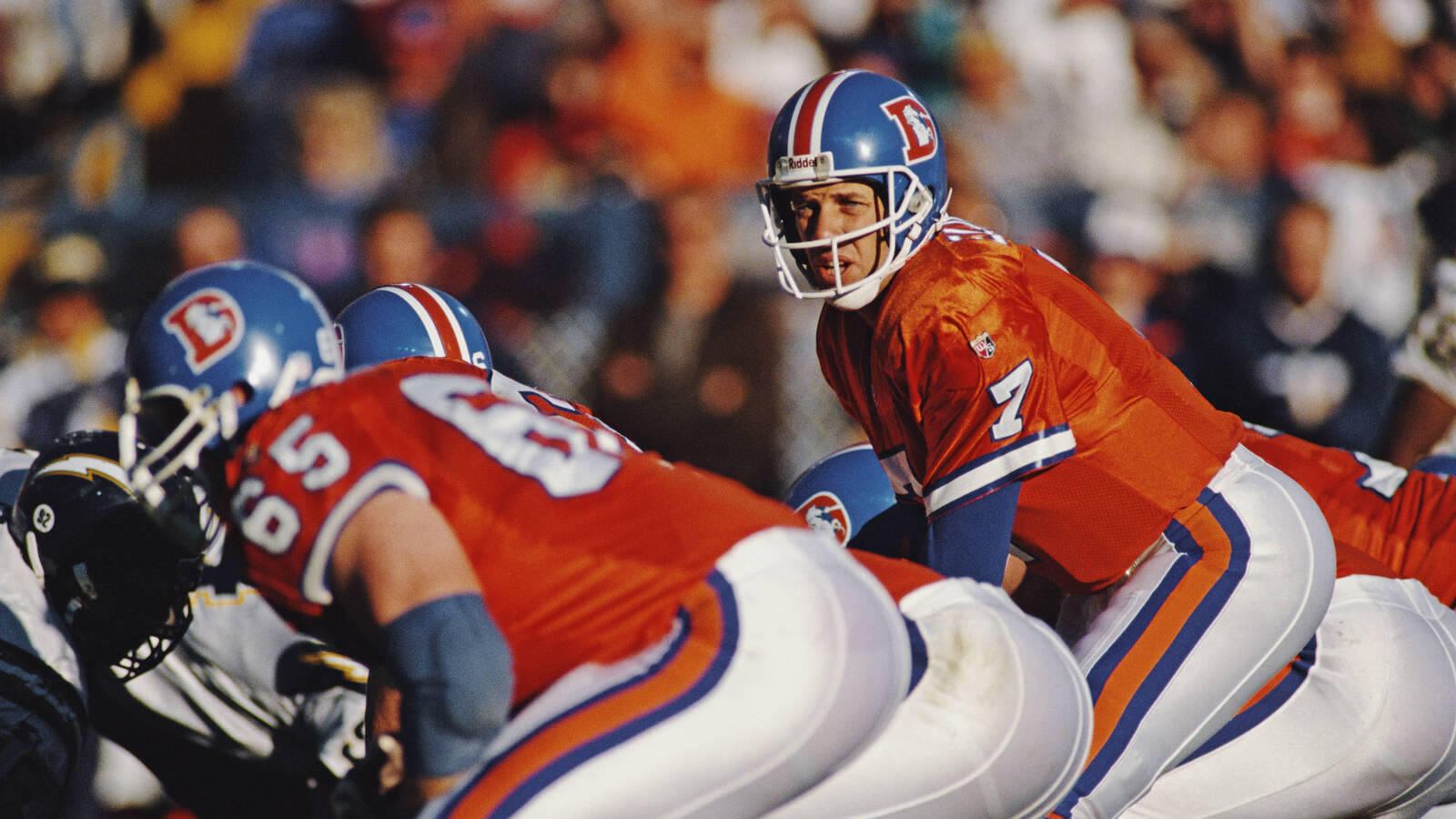
 +
+

